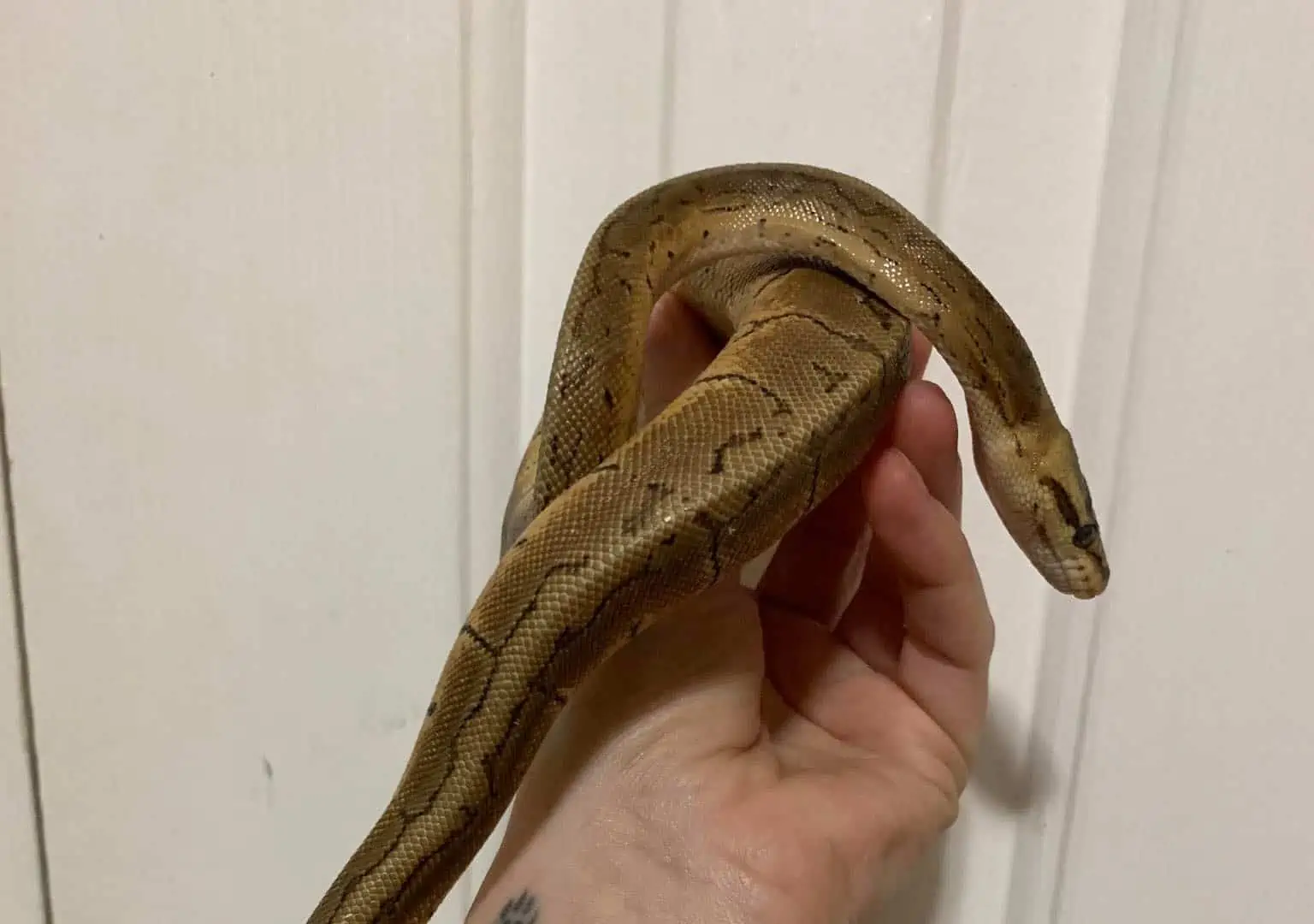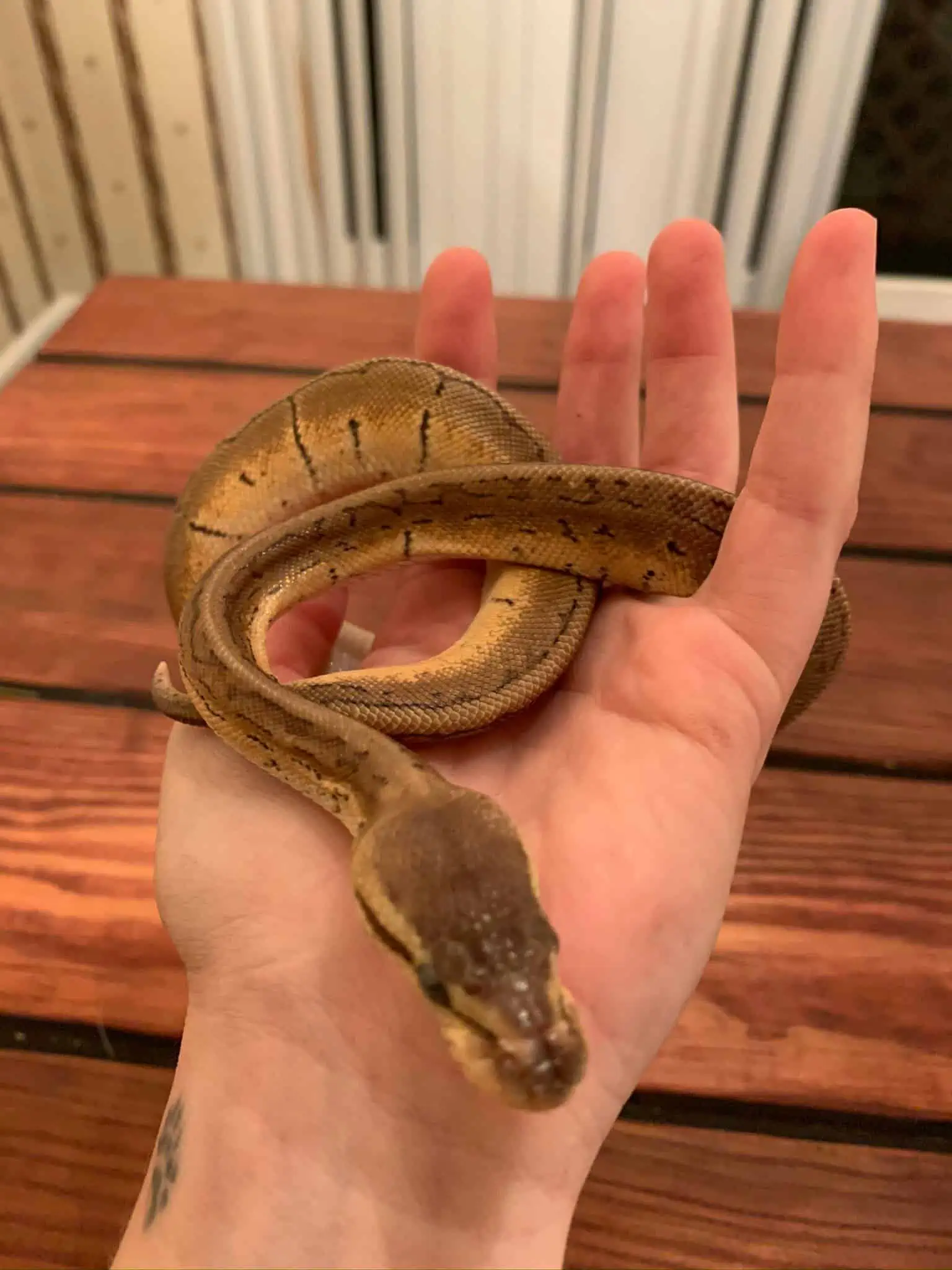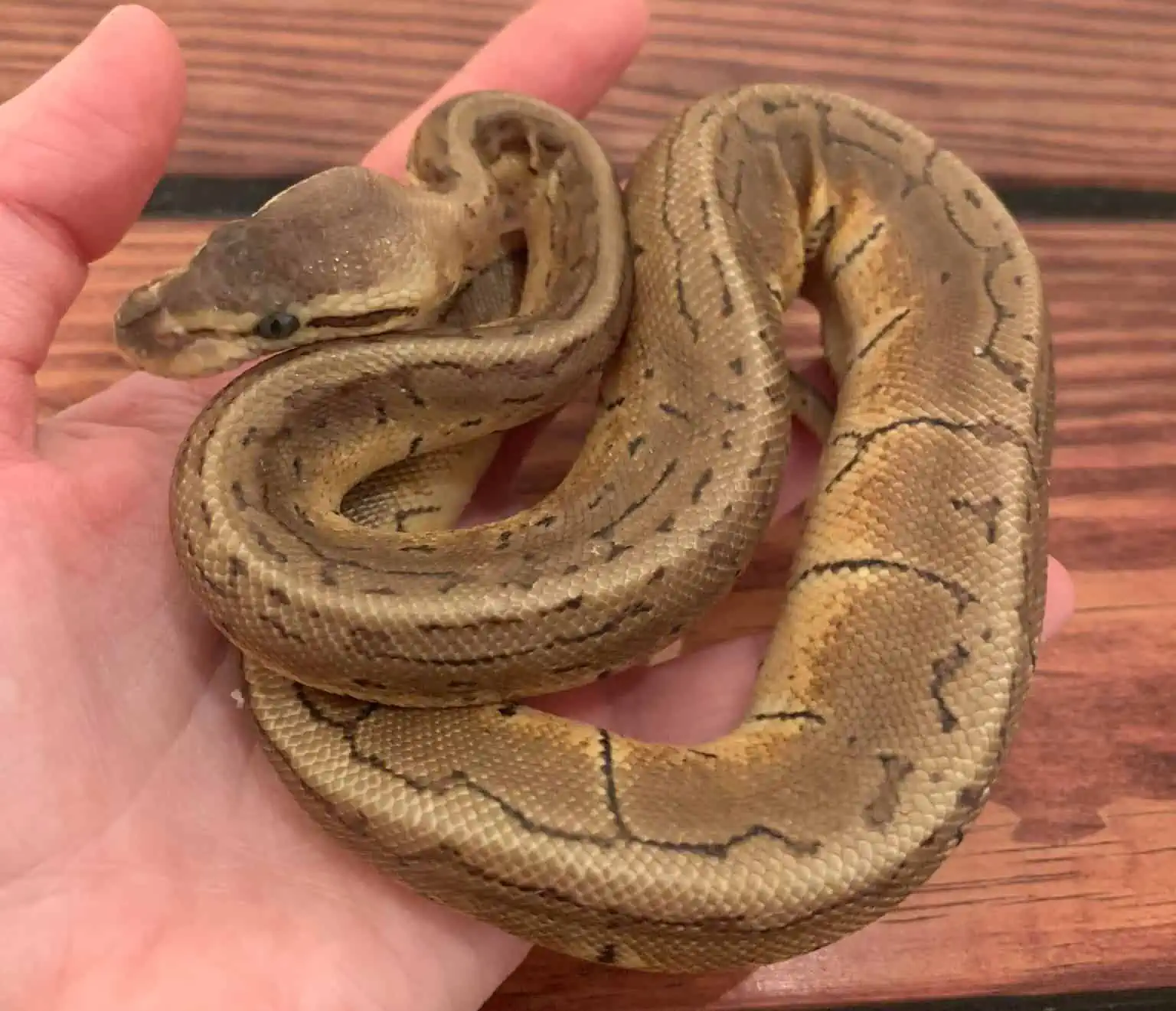The existence of all living creatures, whether they have fur, feathers, or scales, depends on one essential resource – water. Ball pythons require an appropriate level of hydration to stay healthy. This is especially true for captive ball pythons, who rely on their owners to provide them with the right amount of water. A dehydrated ball python is a genuine cause of concern for reptile guardians. Dehydration can be caused by a variety of circumstances, such as:
- Sickness
- Insufficient water intake
- Inadequate humidity and temperature maintenance within an enclosure.
Thankfully, signs and symptoms of dehydration in snakes are straightforward to detect. The most prominent ones include the following:
- Wrinkles around the face or neck.
- Rapid weight loss
- Dry, flaky skin
- Loss of skin elasticity
- Lethargy
- Sunken eyes & cracked eyecaps
- Stuck shed
If you catch mild dehydration early in your snake, then it’s a fairly straightforward process to restore its hydration. Nevertheless, if the issue is more serious and extreme measures are needed to rehydrate your pet, then you’ll need the assistance of an experienced vet.
In this article, we will explore the causes, symptoms, & risks associated with dehydration and provide insight into potential treatments and preventive measures.
Causes of Dehydration in Ball Pythons
Dehydration is a simple term for the lack of sufficient water intake. In the wild, ball pythons don’t require drinking a lot since their habitat has plenty of moisture, and they get most hydration from consuming prey or absorbing it through their skin.
Nevertheless, when keeping them in captivity, there are several aspects to consider to stop your snake from becoming dehydrated: here are some typical triggers for this condition among snakes.
High Temperature
Ball pythons require precise temperatures; however, extreme heat can cause intense water loss leading to dehydration. When presented with high temperatures for extended periods, the snake’s skin will become dry and wrinkly due to the lack of bodily moisture.
Incorrect Humidity
Ball python snakes need a constant humidity level of 60-70% to stay comfortable. When the air is dry or these levels are not kept, they will start drinking from their water bowls and licking themselves excessively and eventually become dehydrated if this goes unchecked.
Not Providing Enough Water
Failing to ensure your ball python snake has access to fresh drinking water can prove devastating, leading to dehydration and potentially inflicting severe issues such as compaction and indigestion.
Parasite
Parasites can cause your snake to suffer from diarrhea, depleting its body of vital moisture as it cannot absorb the liquid in its digestive system. Thus, dehydration sets in rapidly and can be life-threatening if not treated quickly.

Dehydrated Ball Python Signs
Do you suspect your Ball Python may be dehydrated? With a few simple observations, both physical and behavioral patterns of your ball python, you can easily identify signs of dehydration. These may include:
- Wrinkles or skin folds that can be seen on the sides of the face or neck.
- Dry inner mouth & tongue
- Food Refusal
- Weakness
- Dry, Flaky Skin
- Loss of Skin Elasticity
- Lethargy
- Muscular Atrophy
- Dented or cracked eyecaps
- Stuck shed around tail, eyes, & nose
- Constipation
- Rapid weight loss
What Are the Risks of Dehydration?
All living creatures rely on water to sustain them; therefore, it is of the utmost importance that you provide a continual source of clean water for your snake. In addition to death, dehydration will lead to other medical concerns, such as:
- Shock
- Eye infections
- Heart failure
- Acidosis
- Respiratory infections
- Problems passing waste
- Kidney failure
- Problems with food digestion
- Shedding Problems
How Long Can a Ball Python Survive Without Water?
Ball pythons can survive for up to 12 days without water, but after that, their health may start to suffer, and they will die after one month of dehydration. Providing them with a large bowl or dish of fresh drinking water should be your first priority when setting up a habitat for your ball python.
How Can You Rehydrate Your Ball Python?
Dehydration in snakes can come in varying degrees of intensity. Mild cases can often be addressed easily without visiting a vet; however, urgent veterinary care should be sought immediately if there are signs of severe dehydration.
I suggest you use the following remedies if your scaly friend experiences mild dehydration.
Soak Your Ball Python
Rehydrating a dehydrated ball python is best done by soaking the snake in warm water. It can also benefit other issues such as mites, impaction, or helping shed old skin.
To ensure your snake gets a safe and effective soak:
- Use an appropriately sized tub with a locking lid that has holes cut into it.
- Fill the container up enough to provide full coverage at its thickest point.
- Then warm the water to 84-87°F before letting them sink in for no more than 15 to 30 minutes.
Mist Inside the Enclosure
Another way to ensure your ball python is hydrated and the humidity levels in its enclosure remain high is through regular misting. Fill up a spray bottle with clean water at room temperature and spritz inside their home twice daily. It can also help your snake drink more if it’s not feeling well or won’t go near its drinking dish.
Soak Your Ball Python Meal
To give your ball python an extra boost of hydration, soak its food before feeding. I suggest immersing the feeder in lukewarm water for not more than 1 to 3 seconds before handing it over. Not only will this help a dehydrated snake recover faster, but it’s also beneficial as they consume more water while eating!
Infuse Your Ball Python’s Drinking Water With Electrolytes
To replenish the essential fluids of your ball python, you can also add electrolytes to its water. Breeders and keepers alike can use Pedialyte, sports drinks (not energy drinks), or electrolyte-infused waters as sources for these important minerals. With just a little effort, you can provide your pet with abundant health benefits!
Veterinary Treatment
If your ball python’s dehydration is not mild, the previously mentioned remedies don’t work, and any other signs of illness become apparent, you must seek advice from a professional reptilian vet.
Depending on the severity of dehydration, your veterinarian may select from a variety of treatment options:
- They may confine your pet to a humidity chamber
- Administer intraosseous, intravenous, or intracoelomic fluids.
- Some veterinarians can utilize electrolyte baths to help balance and regulate the body’s fluids.
- At times, vets may utilize fluid therapy to quickly and temporarily rehydrate the pet.

How Can You Prevent Your Ball Python From Dehydrating?
Proactive measures are the key to minimizing your ball python’s chance of dehydration and keeping it in optimal health. In addition to following the ball python care sheet, I recommend pet parents use the following simple steps to prevent their ball python from dehydration.
Provide Fresh Water in the Dish
The most critical factor for your snake’s well-being is providing them with a steady water supply. Place the water in an appropriate-size dish, then replenish it frequently, so your snake has enough hydration all day long.
Monitor Humidity Levels
To ensure your ball python’s well-being, you must maintain optimal humidity levels in its enclosure (60% to 70%). Utilizing a digital hygrometer, it’ll be simple to routinely track the moisture content and guarantee that they are always safely below the defined line of comfort for your reptilian companion.
Keep the Enclosure at the Optimal Temperature
To ensure the health and safety of your snake, maintain its enclosure at a balmy 90°F. An excessively high reading will dry out their home, leading to dehydration for your pet!
Use the Right Substrate
Choose the perfect substrate and minimize the chances of dehydration! Coco husk and sphagnum moss are excellent options for keeping your ball python hydrated. Both have a high moisture content, successfully preserving optimal humidity levels in their habitat.
Final Thoughts
Dehydration is a serious and potentially life-threatening condition for ball pythons, but it is manageable with attentive care and the right measures. Symptoms may range from mild to severe and require veterinary attention, depending on the snake’s overall condition. The key to prevention is to provide your pet with adequate hydration and appropriate temperature and humidity levels in its habitat.
Has your pet ever experienced dehydration? How did you address the issue? Share your story and tips below! We’d love to hear them!


